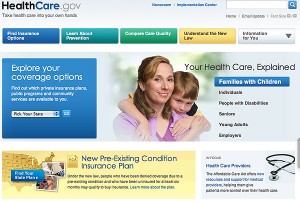The trouble with state health insurance exchanges
May 27th, 2014
Massachusetts may be the next state to switch over to the Affordable Care Act’s federal health insurance exchange in time for this year’s open enrollment period.
Massachusetts is not abandoning its state-run health insurance exchange outright. Instead, the state is planning for a massive overhaul of its system, which performed quite poorly during last year’s open enrollment. The plan now is to switch software contractors from CGI to hCentive, the company that helped build the state exchanges in Colorado and Kentucky.
The contingency plan if hCentive fails to adequately repair the exchange before November 2014 (the start of 2015 open enrollment), is to shift the enrollment responsibility for Massachusetts residents to the federal health insurance exchange at HealthCare.gov.
Experts believe that Massachusetts contemplating a switch to the federal system is something that more and more states will consider as time goes on. Specifically, some have pointed to Nevada, Hawaii, and possibly Minnesota as new candidates for HealthCare.gov.
Some states have already decided to switch over. Back in April, the Oregon legislature voted to abandon their state-run health insurance exchange and turn their ACA health insurance enrollment over to the federal government.
So what does this mean for the future of the ACA? Well, let’s explore how we got here in the first place.
State Health Insurance Exchanges vs. The Federal Health Insurance Exchange
The Affordable Care Act is modeled on the health insurance reform system that was implemented in Massachusetts in the mid-2000s under then-Governor Mitt Romney. That system called for the creation of an online state health insurance marketplace.
This marketplace would be a one-stop shop where residents could look for and purchase comprehensive, affordable health insurance policies. Because this model was fairly successful in Massachusetts, it was adopted and became part of the ACA.
When the ACA was signed into law back in 2010 the plan was to offer federal money to states to help them create and operate their own health insurance exchanges. However, the ACA did not require that states do this. The option was presented to them and they could instead choose to let the federal government do it for them.
During the most recent open enrollment period 27 states chose to allow the federal government to run their health insurance exchanges for them through HealthCare.gov. while only 17 states run their own exchanges. The remaining states partnered with the federal government but did not fully depend on HealthCare.gov for their enrollments.
At any rate, the number of states relying on the federal exchange was much more than originally anticipated. Because of that, the system crashed almost immediately at the start of open enrollment last year. The result was a scramble/blame game to get the system fixed and running smoothly before the end of open enrollment.
Why switch over to HealthCare.gov?
Despite the initial technical problems, the larger-than-expected number of states deferring to HealthCare.gov resulted in the system becoming incredibly large and robust. Many states, especially those that experienced serious technical issues with their own exchanges, now see HealthCare.gov as an attractive option.
Rather than spending the money, time, and manpower required to get their own exchange functioning properly and up to the standards of the ACA, states can save their energy and simply have the federal government do it for them.
This decision for many states is economic in nature. Despite the help of federal funds to aid in the creation of the exchanges, states are on the hook for any extra money that may be needed to further improve and refine their respective exchanges. In many cases that money could be equal to or even more than what they originally paid to have the exchange created.
However, by switching over to the federal health system they no longer have to worry about paying the money to keep everything running and they’re not on the hook financially for any further improvements.
The future for Exchanges?
It is difficult to say now what the future will look like for state health insurance exchanges versus the federal one. As time goes on experts predict that more and more states will turn over their exchanges to the federal government. However it is still early on in the life of the Affordable Care Act, and it is difficult to make reliable predictions.
One thing is certain though, that many of the state exchanges will need a lot of improvements before the next open enrollment period. States with relatively smooth functioning exchanges like New York, Connecticut, and California were the exceptions during the 2014 enrollment season.
Related posts from our blog:
No related posts.
Tags: Health | health insurance exchange | healthcare.gov | massachusetts | new york state
Posted in: Simon Bukai | Comments Off
